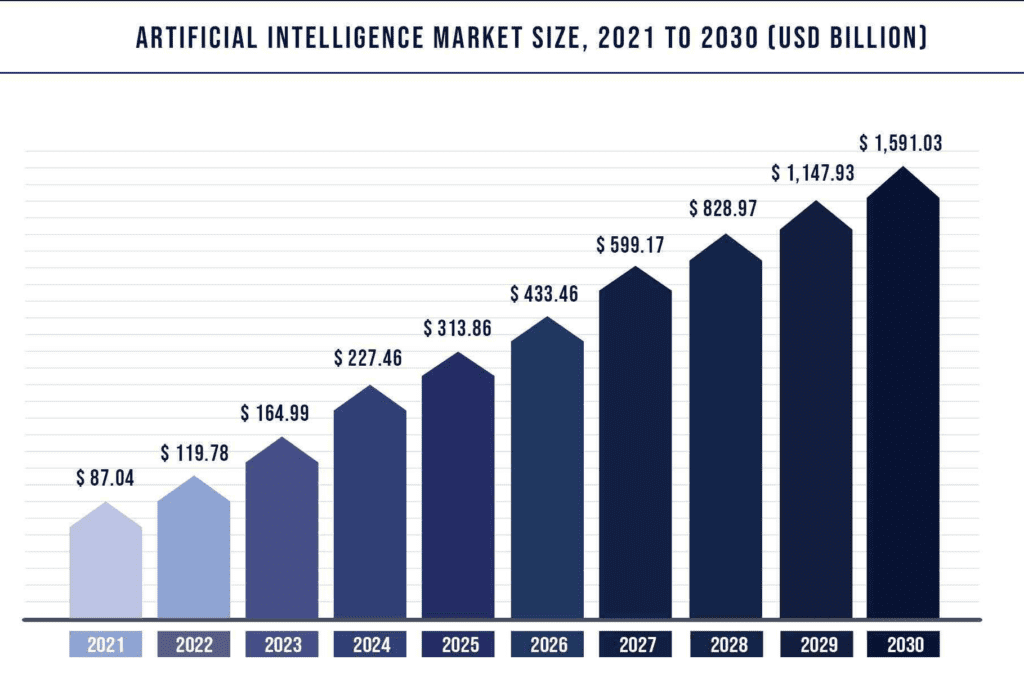AI in ERP
Future is approaching us, and so organizations are investing heavily in artificial intelligence (AI) technology, which is the next FUTURE. So, what is Artificial Intelligence? It is the ability of a digital computer or computer-controlled robot to perform tasks commonly associated with intelligent beings. The term is frequently applied to the project of developing systems with human-like cognitive processes, such as the ability to reason, discover meaning, generalize, or learn from past experience. Since the development of the digital computer in the 1940s, it has been demonstrated that computers can be programmed to perform extremely complex tasks with great proficiency. Combining AI with machine learning and advanced analytics, makes business data more actionable than ever before. As per the stats, the global artificial intelligence (AI) market size was estimated at US$ 87.04 billion in 2021 and it is expected to hit US$ 1,597.1 billion by 2030 with a registered CAGR of 38.1% from 2022 to 2030.


So, do you intend to follow suit? By incorporating AI tools into your enterprise software, you can extend the functionality of your core features and get more bang for your bucks. Let’s discuss the role of AI in ERP and how it’s transforming businesses.
Benefits of Integrating AI in ERP
Adapting Complex Data
One feature that distinguishes AI from mechanical or rule-based data analytics is its ability to adapt and learn, which means that it searches for deep and complex patterns. This processing action is similar to how the human brain works in many ways. It does not follow hard-coded, static rules that never change. Infact, it’s fluid and adaptable, constantly interpreting new information and applying those insights to make decisions. When ERP is given this level of adaptability, you can go beyond simply capturing your business data. You can use it to make your operations stronger and more efficient. AI in ERP can help your organization with planning, problem-solving, and strategy with minimal human intervention.
Supply Chain Forecasting
Predictions that are accurate help functions like warehousing and supply chain management run more smoothly. For example, supply chains change on a near-constant basis, making traditional ERP systems difficult to keep up. When AI is integrated into ERP processes, it is possible to improve predictions by comparing historical data to current conditions. This makes it easier to balance supply and demand in the production sphere, assisting organizations in avoiding common issues such as overproduction or underproduction. AI in ERP can also detect inefficient processes in real time, providing solutions to improve performance and cut unnecessary costs. They can even identify which processes consume excessive amounts of energy, suggest alternatives, and use predictive diagnostics to reduce resource waste. AI assists warehouse managers in improving demand forecasting so that they can better prepare their workforce for supply chain disruptions.
Accuracy
ERP software is already used by many businesses to help with accounting, auditing, and financial document preparation. With AI in ERP, you can run those reports through an intelligent program capable of detecting common issues, such as data entry irregularities and suspicious or unusual transactions. AI can quickly analyze all of the data accumulated by users and vendors alike, assessing your overall level of financial risk with a few clicks. Some tools can even be trained with expert CPA knowledge using machine learning applications. Finance departments can use AI in ERP to improve forecasting accuracy, similar to how warehouse managers use the software to make smarter predictions, with this level of intelligence. In accounting, artificial intelligence (AI) can do more than just forecast a profit and loss (P&L) statement. It can also use internal and external data sources to look for trends and correlations that will help you with your forecasting tasks.
Enhanced Reporting
The integrated AI in ERP system can extract business data and generate insightful reports in the format desired by the users. This eliminates the hassle need for manual data extraction, making calculation, and reconciliation in order to generate reports. Automation makes it much easier to find specific information and, more importantly, improves reporting accuracy, which adds more value in terms of analytical decision-making for driving business growth and increasing ROI.
At Rockford Computer, our team of ERP consultants can help you assess where AI in ERP can benefit your operations the most. Contact us anytime for a free consultation.








